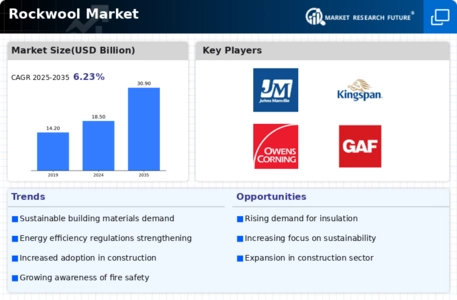Market Trends
Key Emerging Trends in the Rockwool Market
The market trends of Rockwool, also known as mineral wool or stone wool, are undergoing significant changes driven by factors such as sustainable construction practices, energy efficiency requirements, and the increasing focus on fire resistance. A notable trend in this market is the growing demand for Rockwool insulation as a key component in sustainable building solutions. As environmental consciousness rises, architects, builders, and homeowners are turning to Rockwool insulation for its eco-friendly properties. Manufactured from natural basalt rock and recycled slag, Rockwool is non-combustible and offers excellent thermal and acoustic insulation, aligning with the global push for green and energy-efficient construction materials.
Moreover, there is an increasing emphasis on fire-resistant insulation solutions in the Rockwool market. With fire safety being a critical concern in construction, Rockwool insulation has gained popularity for its inherent fire-resistant properties. This trend is particularly significant in applications where building codes and regulations require materials with high fire resistance, such as in commercial buildings, industrial facilities, and residential constructions.
Customization is emerging as another key trend in the Rockwool market. Construction projects often have unique requirements based on factors such as building design, climate conditions, and specific insulation needs. Manufacturers are responding by offering a variety of Rockwool products with different densities, thicknesses, and forms to cater to diverse construction applications. This trend allows builders and contractors to select Rockwool insulation solutions tailored to the specific requirements of their projects, ensuring optimal performance and efficiency.
Technological advancements are playing a pivotal role in reshaping the Rockwool market. Manufacturers are investing in innovative production processes to enhance the performance characteristics of Rockwool insulation. Advanced manufacturing techniques, such as dual-density technology and hydrophobic treatments, contribute to improved thermal conductivity, water resistance, and durability. These technological advancements ensure that Rockwool insulation continues to meet and exceed industry standards for efficiency and longevity.
Furthermore, there is a growing trend towards the use of Rockwool in applications beyond traditional insulation. The versatility of Rockwool extends to horticulture, where it is used as a growing medium for plants. Rockwool's ability to retain water, provide a stable pH environment, and offer excellent aeration makes it a preferred choice for hydroponic and soilless cultivation. This diversification of applications showcases Rockwool's adaptability and the expanding scope of its market reach.
In terms of market dynamics, competition among Rockwool manufacturers is intensifying. Companies are investing in research and development to enhance the sustainability, fire resistance, customization, technological features, and versatility of their Rockwool products. Meeting industry standards for insulation performance, fire safety, and environmental impact, as well as staying attuned to evolving construction practices, are critical factors for success in this competitive market. As the construction industry continues to prioritize sustainable and fire-resistant building materials, the Rockwool market is expected to witness sustained growth and further innovation.
















Leave a Comment